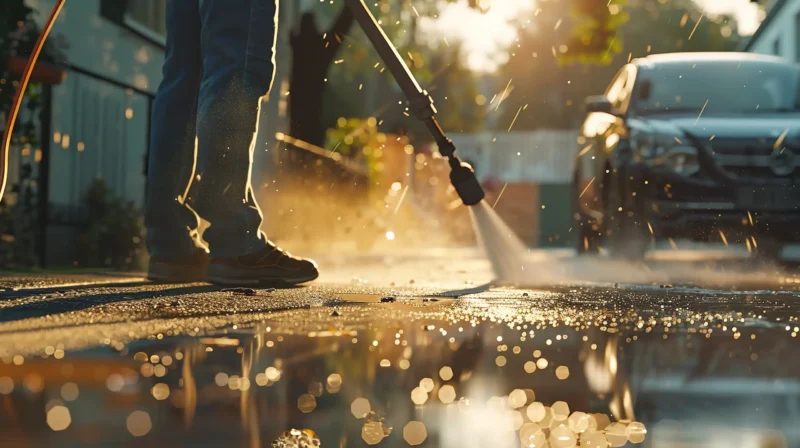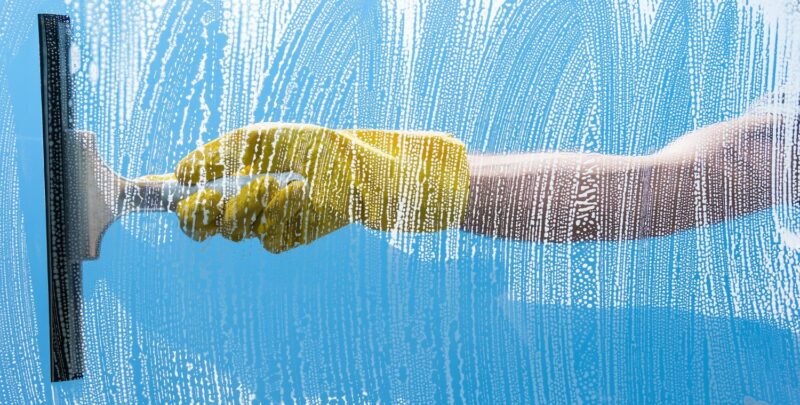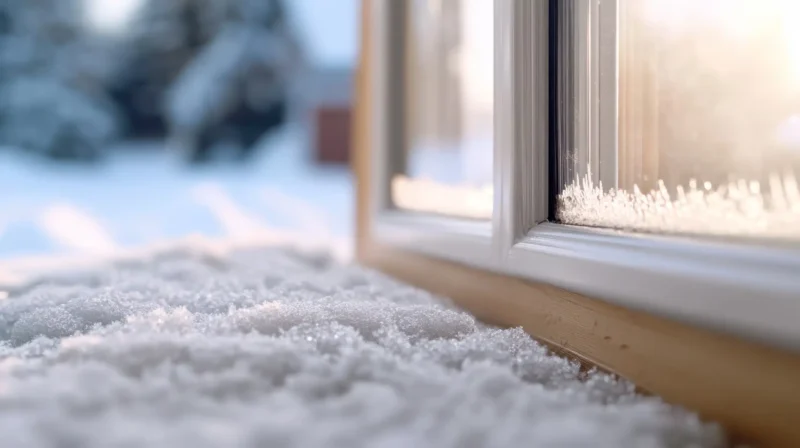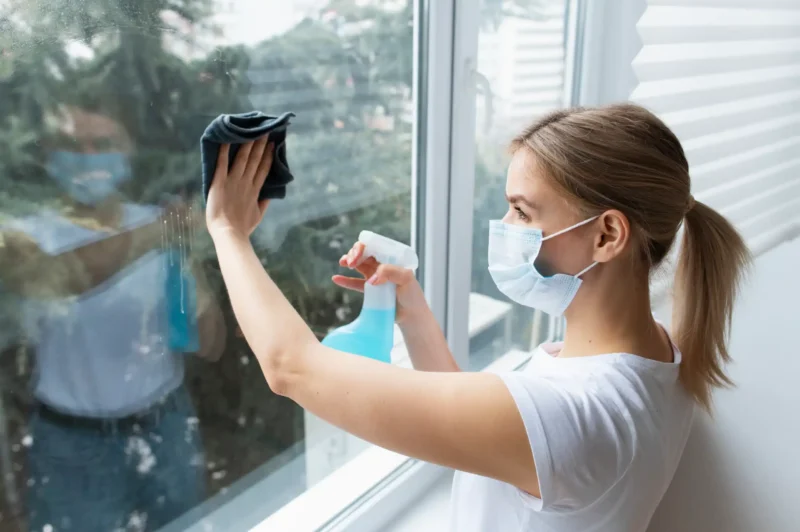Keeping your driveway clean and well-maintained is essential for both the appearance and longevity of your property. One of the most effective ways to achieve this is to pressure wash your driveway regularly. Pressure washing uses high-powered water jets to blast away dirt, grime, and stains that accumulate over time, restoring your driveway to its original condition.
While it may seem like a simple task, there are best practices to follow and common mistakes to avoid when you pressure wash a driveway. Before we dive into the details, let’s consider some key benefits of this maintenance technique:
- Removes stubborn stains and grime
- Prevents mold and mildew growth
- Extends the lifespan of your driveway
- Improves safety by removing slippery substances
In this article, we’ll explore the proper way to pressure wash your driveway pain-free. By following these guidelines, you’ll be able to effectively clean your driveway while protecting its surface.
Preparing Your Driveway for Pressure Washing: Essential Steps
Proper preparation is a crucial part of an effective driveway pressure washing routine. Taking the time to set up correctly not only ensures your safety but also maximizes the cleaning efficiency and results. Here are the essential steps to undertake before pressure washing the driveway:
- Gather necessary equipment:
Collect your pressure washer, appropriate nozzles, safety gear, and cleaning solutions. Having everything on hand before you start will save time and prevent interruptions during the cleaning process.
- Clear the area:
Remove vehicles, outdoor furniture, and any obstacles from the driveway. This will provide unobstructed access to the entire surface and prevent accidental damage to your belongings.
- Protect surroundings:
Cover nearby plants, electrical outlets, and delicate surfaces to prevent damage from water or debris. This step safeguards your landscaping and home from potential harm caused by high-pressure water or cleaning chemicals.
- Repair significant damage:
Fill large cracks or holes to prevent water from seeping underneath and causing further damage. Addressing these issues beforehand ensures a more effective cleaning and protects your driveway’s structural integrity.
- Pre-treat stubborn stains:
Apply a degreaser to oil spots or other harsh stains before pressure washing. This extra step helps break down difficult stains, making them easier to remove during the pressure-washing process.
- Sweep the surface:
Remove loose debris and dirt to improve the pressure washer’s effectiveness. Clearing away surface debris allows the pressure washer to focus on embedded dirt and stains, resulting in a more thorough clean.
By following these preparation steps, you’ll create an ideal environment for pressure washing. This ensures a thorough cleaning while protecting your property and maximizing the benefits of this important maintenance task.
Driveway Pressure Washing: Dos and Don`ts
Effective driveway maintenance through pressure washing requires a combination of proper techniques and cautious practices. By understanding the dos and don’ts of this process, you can achieve a clean, well-maintained driveway while avoiding potential damage or safety hazards. Let’s explore the best practices and common pitfalls to ensure your efforts are successful:
Dos:
- Use appropriate pressure settings: Adjust the pressure based on your driveway’s material and condition to prevent damage.
- Apply detergent: Start with a low-pressure application of a suitable pressure washing solution for enhanced dirt removal.
- Work in sections: Divide your driveway into manageable areas to ensure thorough cleaning and prevent streaking.
- Maintain a consistent distance: Keep the nozzle about 12-18 inches from the surface for optimal cleaning power.
- Use sweeping motions: Move the wand in a steady, overlapping pattern to avoid missed spots or uneven cleaning.
- Rinse thoroughly: After cleaning each section, rinse away all detergent and debris for a spotless finish.
Don’ts:
- Use excessive pressure: High pressure can etch concrete or damage softer materials like asphalt.
- Hold the nozzle too close: This can cause surface damage and create visible “etching” patterns.
- Neglect safety gear: Wear protective eyewear, closed-toe shoes, and hearing protection.
- Avoid spraying towards cracks or edges: This can force water under the surface, potentially causing further damage.
- Rush the process: Take your time to ensure even cleaning and avoid missing spots.
- Use hot water: Cold water is usually sufficient and safer for most surfaces. Not all pressure washers are designed for hot water use, and it can damage standard models. If hot water is needed, power washing is the cleaning method you need.
By following these guidelines, you’ll be well-equipped to effectively pressure wash your driveway. With practice and patience, you’ll achieve professional-quality results while preserving the longevity of your driveway.
When to Hire Professionals to Pressure Wash a Driveaway
Pressure washing by yourself can undoubtedly be effective. However, there are times when hiring professionals to pressure wash the driveway is the best choice. Professional services offer several advantages, including access to industrial-grade equipment, expertise in handling different surface materials, and the ability to tackle stubborn stains effectively. They can save you time and effort while ensuring long-lasting results.
Professionals have the knowledge and experience to choose the most appropriate method for your specific driveway. They can effectively remove mold, dirt, pollen, and other contaminants that are resistant to traditional cleaning methods. This expertise is particularly valuable when dealing with stubborn dirt that’s immune to regular cleaning techniques.
Our team at Windows Cleaning Expert offers first-rate pressure washing services tailored to your specific needs, ensuring your driveway looks its best year-round. By choosing our services, you guarantee a thorough, efficient, and worry-free solution to maintain your driveway’s appearance and longevity.
FAQ
- How often should I pressure wash my driveway?
Most experts recommend pressure washing your driveway once a year. However, the frequency depends on various factors like climate, traffic, and nearby trees. Some driveways may need cleaning every 6 months, while others can go 18-24 months between washes. Regular cleaning helps maintain appearance and prevent the buildup of harmful substances.
- What PSI is needed to clean a concrete driveway?
For concrete driveways, use a pressure washer with at least 3000 PSI. This level of pressure is typically sufficient to effectively clean concrete surfaces without causing damage. Always start with a lower pressure setting and adjust as needed.
- Is it necessary to use detergent when pressure washing a driveway?
While not always necessary, using a detergent can enhance cleaning effectiveness, especially for stubborn stains. Apply a suitable cleaning solution before pressure washing, letting it sit for 5-10 minutes to break down tough stains. Rinse thoroughly after cleaning.




